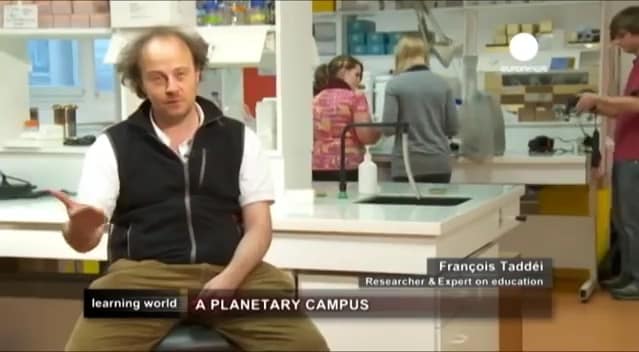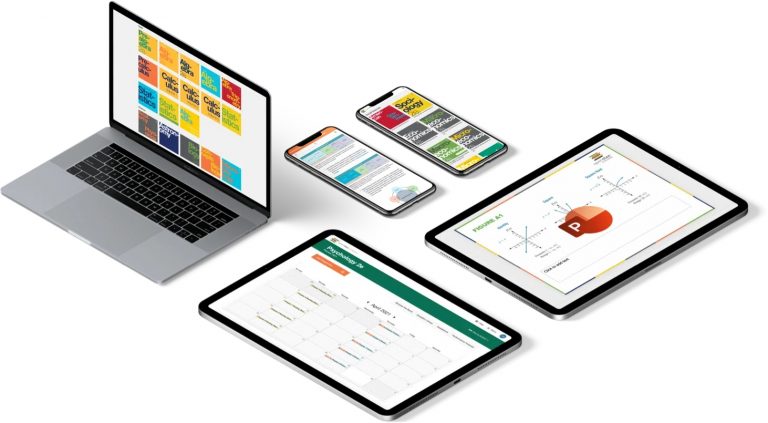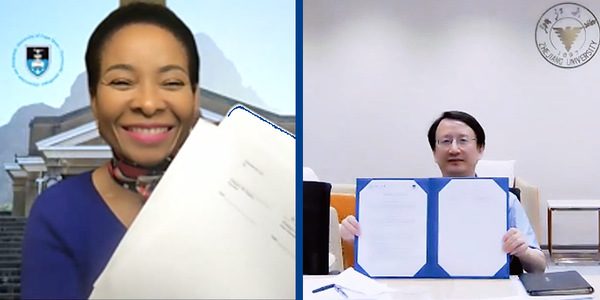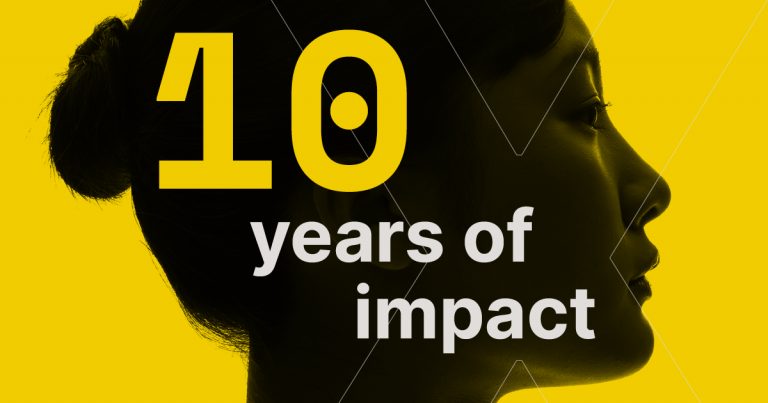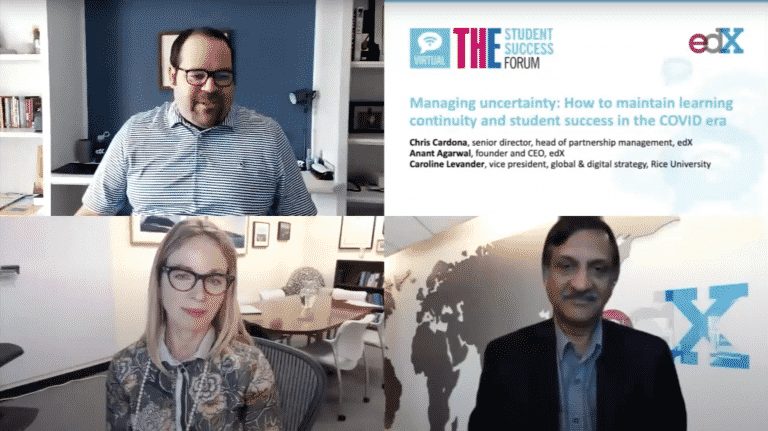In the context of the Geneva Trialogue, the European research project Crowd4SDG held a hybrid workshop on March 17th called “Closing the gap between institutions and citizen science generated data and solutions”.
The Learning Planet Institute (formerly known as “CRI”, a co-founding member of the Global MOOC and Online Education Alliance), Université Paris Cité and their associate partners of the consortium Crowd4SDG gathered institutional members and finalists of the most promising projects to provide the projects with concrete feedback. During this one-day workshop, the group gave an update on the progress of the Crowd4SDG project, emphasizing its mission: to launch youth-led crowdsourcing projects that track progress towards the SDGs and generate local innovations for the SDGs.
Participants brainstormed to identify the gaps between institutional data and data generated by citizen science. They discussed how the gaps can be bridged by sharing knowledge and creating synergies and potential partnerships, particularly in the fields of water and sanitation.
The Crowd4SDG consortium (UNIGE/Citizen CyberLab, CERN, CSIC/IIIA, Politecnico di Milano, UNITAR, Universite Paris Cité/Learning Planet Institute) promotes citizen science aimed at the SDGs, focusing on Climate Action. The goal of this EU-funded project is to assess the usefulness of practical innovations developed by the teams, and research and investigate how AI applications can enhance and provide effective monitoring of SDG targets and indicators by citizens.
Initiatives organized by Crowd4SDG follow a robust innovation cycle called GEAR (gather, evaluate, accelerate, refine) over six months for each period. The second cycle started in August 2021 aims to tackle climate and gender issues. Five teams completed a challenge-based innovation workshop hosted by IdeaSquare at CERN. The Geneva Trialogue marked the end of this second GEAR cycle where the two finalists presented their projects and received substantial opportunities for subsequent development. Crowd4SDG partners are now preparing for the final cycle, which will begin in the coming months.
Finalist 1: “WOMEN”
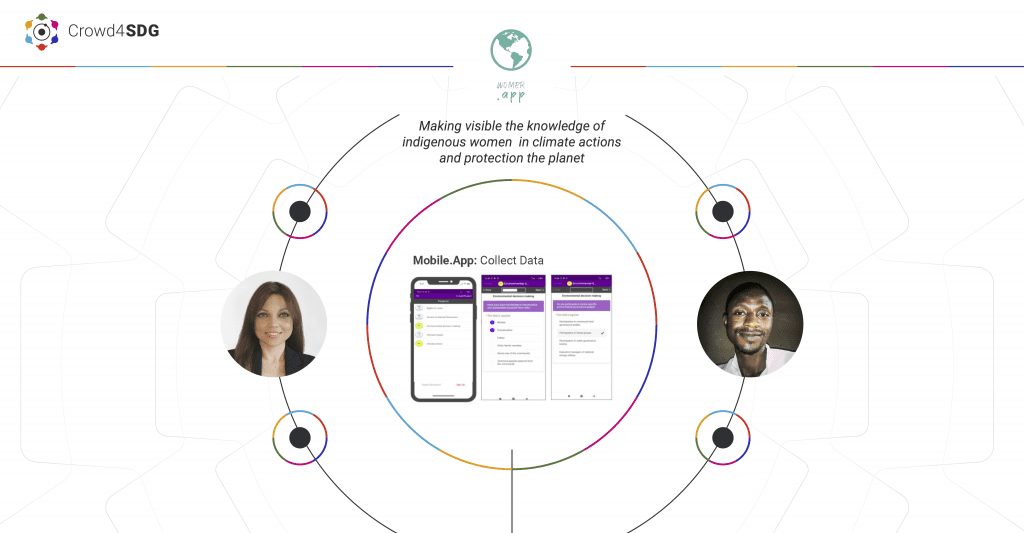
Indigenous women are absent from climate decision-making at all levels. Moreover, Local indigenous organizations don’t have evidence of indigenous women’s role in conserving the planet’s biodiversity and fighting climate change due to a lack of skills and resources to analyze the data.
Objective: Making visible the knowledge of indigenous women on climate actions protecting the planet
WOMER is a crowd-sourcing data solution that combines a Mobile App and a Web app. Indigenous women use the Mobile App to collect data on 32 indicators related with access to natural resources, climate impacts, participation in decision making, and climate actions. WOMER offers a WebApp where indigenous women and local organizations can access their data, analysis and reports. WOMER establish a protocol of F.A.I.R Data management to ensure the access and protection of the data.
Increase the participation of indigenous women in climate decision-making at all levels through making visible the indicators of access to natural resources, time invested and climate actions to protect nature.
What have we done?
- User research
- Interviews and meeting with local organization of indigenous women
- Partnership wit a local organization of ingenious women in Colombia
- Partnership with the Agroecology group of the National University
- Design of the prototype: The Mobile app is designed using Epicollect5 and the prototype of the WebApp is designed in Streamlit
- Testing the Questions in the Mobile App with 2 end-users
Finalist 2: “DONATE WATER”
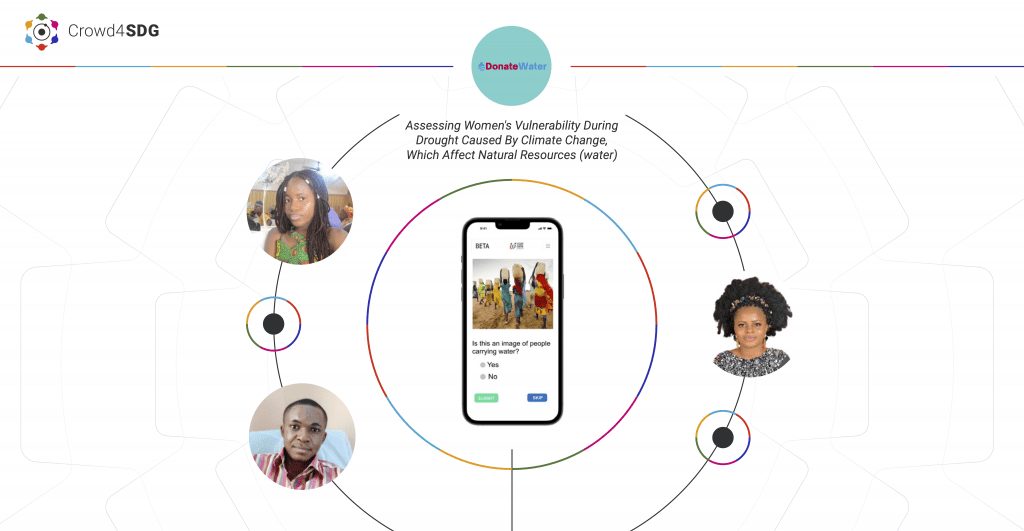
Objective: DonateWater project aimed at providing potable water all year round for target rural communities in Nigeria faced with the challenge of accessing potable water.
According to a survey by Federal office of statistics Nigeria 61% of rural dwellers do not have access to potable water. Over 70% of households in rural communities rely solely on self-water supply (free source) such as rivers, perennial streams, water ponds and unprotected wells which are not clean and are dried up during dry seasons. Women and children suffer the most effect due to socio-cultural settings and norms. These women are forced to rise up early every day, going in search of water, they sometimes walk several miles to locate a natural source of water. At the same time they are exposed to other risks of molestation, kidnappings, ethnic and territorial frictions. Most of the time they are forced to dig the rivers just to get some water not minding if it’s clean or not. And these has exposed the people to water-borne diseases. Children go late to school or miss classes because they also assist their mothers in fetching water. There are existing water facilities in some of these rural communities that are broken and abandoned, and the people still had to go back to fetching water from local source.
We are proposing a simple climate-responsive solution to combat the identified problem; Solar Powered Pumps. This solution is cost effective, easy to install and maintain, and it will make water available all year round especially during the dry seasons. We will also be able to convert some of the broken hand-pumps into solar powered pumps. The facilities will have sensors which will detect fault and alert stakeholders.
The impact will be felt mostly on women and children because they will no longer travel far in search of water which will reduce their vulnerability to danger, children will not miss classes or will go to school early, agricultural activities will improve, the people will not be exposed to water-borne diseases.
Current state of development and what is the project looking for? We are in the data collection phase of the project. We have set up our project on the Citizen Science project builder and about to publish. We have also begun social media campaign, creating awareness and seeking for volunteers to participate with our project on the CS project builder. We have also spoken with potential partners from India and a few have agreed to work with us.
Reflections from finalists during Geneva Trialogue
The two finalists “WOMER” and “DONATE WATER” also shared their observations on the challenges and opportunities they faced while implementing their projects. The group as a whole identified some challenges that need to be tackled, notably around:
- Aligning SDG methodologies with how data is collected.
- Confidence in citizen science data built from scratch versus existing data.
- Institutional resistance to data quality, design and other forms of implementation.
- Linkages between NSOs (national statistical offices) and citizen science initiatives.
REFERENCE: https://learningplanetinstitute.org/en/newspage?id=6253ec80ef9928003d72b952



